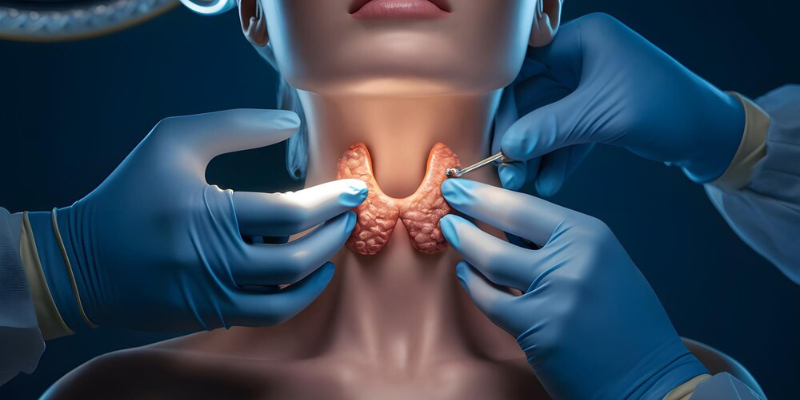Thyroid Surgery Treatment
Thyroid Surgery Treatment

Treatment Range Hospital in Hyderabad offers expert thyroid surgery for patients dealing with thyroid nodules, goitre, hyperthyroidism, or thyroid cancer. Our experienced surgical team specializes in both partial and total thyroidectomy procedures using advanced, minimally invasive techniques. With a strong focus on safety, precision, and recovery, we are recognized as one of the best hospitals for thyroid surgery in Hyderabad.
Each patient receives a thorough evaluation through blood tests, ultrasound, fine-needle aspiration (FNAC), and other diagnostic tools to determine the best surgical approach. The procedure is performed under general anesthesia, often as a short-stay surgery, with close monitoring and post-operative care. At Treatment Range Hospital, we prioritize preserving voice quality, minimizing scarring, and managing hormonal balance after surgery.
If you are looking for thyroid surgery in Hyderabad, Treatment Range Hospital provides trusted care, advanced infrastructure, and personalized treatment plans. Whether it’s a benign thyroid condition or a more complex case, our skilled team ensures a safe and effective path to recovery and long-term wellness.
- Your 6 - Phase health Process
Your Complete Thyroid Surgery Treatment Journey
🔍 Phase 1: Symptom Identification
- Neck swelling or visible lump
- Hoarseness or voice changes
- Difficulty swallowing or breathing
- Unexplained weight loss or gain
- Family history of thyroid disease or cancer
🧪 Phase 2: OPD Consultation with Endocrine Surgeon
- Physical examination of the neck
- Review of symptoms and medical history
- Discussion of potential causes (benign vs malignant)
- Recommendations for further testing
🔬 Phase 3: Diagnosis & Preoperative Evaluation
- Thyroid function tests (TSH, T3, T4)
- Ultrasound of the thyroid gland
- Fine needle aspiration (FNA) biopsy for nodules
- CT/MRI scan if needed to assess extent or compression
- Laryngoscopy to check vocal cord function (in selected cases)
⚠️ Phase 4: Postoperative Care
- Hospital stay: 1–2 days
- Observation for bleeding, infection, calcium levels
- Pain control and neck mobility support
- Wound care and hygiene instructions
- Monitoring for hoarseness or voice changes
📈 Phase 5: Monitoring & Gradual Recovery
- Doctors will track urine output and kidney blood test levels
- Dialysis may be stopped once kidneys begin working again
- Nutrition support (low-protein diet, fluid control)
- Frequent monitoring of fluid, blood pressure, and medications
🏥 Phase 6: Recovery & Long-Term Follow-Up
- Return to normal activities in 1–2 weeks
- Lifelong thyroid hormone replacement (if total thyroidectomy done)
- Calcium and vitamin D supplements if parathyroid glands affected
- Follow-up thyroid scans, labs, and possible endocrinology consultation
- Cancer surveillance if surgery was for malignancy
Insurance Support










- Why Choose Us
Why patients trust us with their care
- Patient Testimonials
Patient stories of care and recovery










- Frequently Asked Questions
Helping you understand Our healthcare
Thyroid surgery (thyroidectomy) involves removing all or part of the thyroid gland. It is performed to treat thyroid cancer, large goiters, thyroid nodules, or overactive thyroid (hyperthyroidism).
Most patients experience mild to moderate discomfort, especially in the neck area, for a few days after surgery. Pain is usually well managed with prescribed pain relievers and improves quickly within the first week.
Typically, patients stay 1 to 2 days in the hospital after thyroid surgery. In some cases, it may be done as a same-day procedure depending on the type and complexity.
If the entire thyroid is removed (total thyroidectomy), you will need lifelong thyroid hormone replacement therapy. If only part of the gland is removed, hormone therapy may or may not be needed.
Some patients may notice temporary hoarseness or voice fatigue. Permanent voice change is rare, especially when performed by an experienced surgeon.